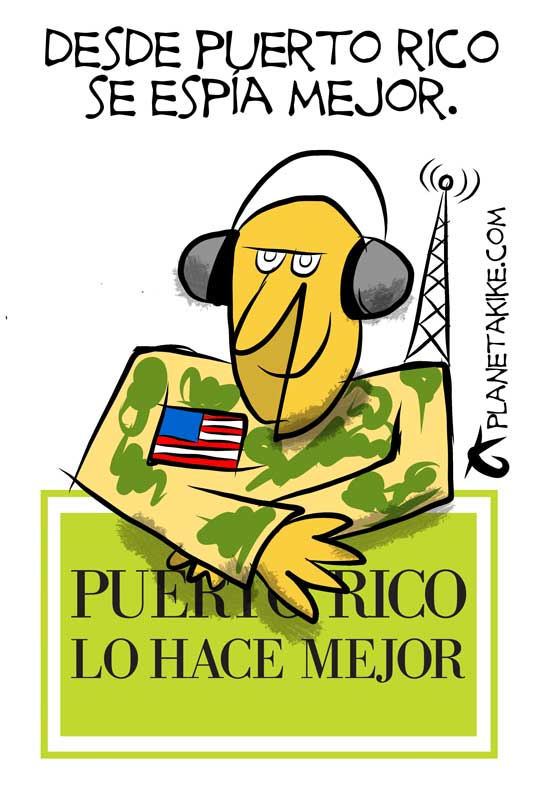See our special coverage Snowden: The US is Watching You.
Edward Snowden's disclosures regarding the U.S. government's massive electronic surveillance program and its global reach, continue to have repercussions. The Center for Investigative Journalism of Puerto Rico (CPI) has written [es] about the role of the Island in the espionage of its Latin American neighbors.
Several Latin American and Spanish media sources originally revealed the information.
The CPI explains that at the now closed naval base in the Sábana Seca zone of the Toa Baja municipality, close to the capital city of San Juan, the NSA and the CIA (National Security Agency and the Central Intelligence Agency) maintained a joint operation for years collecting data on the communications of citizens of Latin American countries, such as Brazil, Colombia and Venezuela. The classified information that Snowden has revealed offers the evidence. According to the article:
Esta operación en Puerto Rico servía para coordinar con otras oficinas en Brasilia, Bogotá, Caracas, Ciudad de México y Ciudad de Panamá mediante un programa llamado Fornsat, con el que la NSA y la CIA interceptaron miles de millones de llamadas telefónicas, mensajes electrónicos y de texto y comunicaciones por Internet privadas.
This operation in Puerto Rico served to coordinate with other offices in Brasilia, Bogotá, Caracas, Mexico City, and Panama City through a program called Fornsat, which the NSA and the CIA used to intercept billions of telephone calls, electronic and text messages, and private Internet communications.
Despite the fact that the base in Sábana Seca closed because changes in technology made it obsolete —according to the Navy—, there is still a facility in the Ingenio neighborhood that, according to the CPI, is the “backbone” of Echelon, a program with U.S. allied nations created during the 1960s Cold War “to intercept the core communications via satellites.”
On Twitter, the CPI article was spread extensively. More than surprised, people expressed the feeling that their suspicions, harbored for quite some time, regarding the Toa Baja base-still under the control of the U.S. Navy- had been confirmed:
@Nancy_Millan: El que sorprenda con esta noticia no sabe en que país vive. http://fb.me/6orBuTQWh
@Nancy_Millan: Whoever is surprised by this news doesn't know what country they're living in. http://fb.me/6orBuTQWh
@ImperioCaliban: Sabia que era cuestión de tiempo para que Puerto Rico terminara involucrado en el espionaje denunciado por Snowden cpipr.org/historias/48-a…
@ImperioCaliban: I knew it was a question of time for Puerto Rico to end up involved in the espionage denounced by Snowden cpipr.org/historias/48-a…
@LeilaMovil: El equipo de espionaje de EEUU ha estado aquí hace décadas. Esto confirma que siguen usándolo. #PuertoRico#Snowdenhttp://ow.ly/mTRnF
@LeilaMovil: The U.S. espionage team has been here for decades. This confirms that they continue using it. #PuertoRico#Snowdenhttp://ow.ly/mTRnF
@Felotrompeta: Entonces habrán algunos que justificarán y/o verán con buenos ojos estás acciones… http://fb.me/RVCz0fvt
@Felotrompeta: So there will be some that will justify and/or see these actions with good eyes… http://fb.me/RVCz0fvt
@rickyreys: Y no se crean q el #NSA no verifica los Data Centers de Puerto Rico
@rickyreys: And do not believe that the #NSA does not verify the Data Centers in Puerto Rico

Cartoon by Kike Estrada alluding to the slogan of the Tourism Company of Puerto Rico “Puerto Rico does it better.” (Translation: “Spying is better from Puerto Rico.”)
Curiously, given the gravity and the implications of the information disclosed by the CPI, the news has not had nearly the presence that it should in the traditional Puerto Rican media. Journalist Hiram Guadalupe (@hiramgp) commented on this in a column published on July 12 on the Metro [es] website:
Llama la atención, sin embargo, la poca importancia que los medios corporativos puertorriqueños han mostrado sobre este asunto al manifestar cautela en la divulgación de esta investigación que, por su trascendencia, debería ocupar las primeras planas de informativos impresos y electrónicos.
It is striking, however, the little importance that the Puerto Rican corporate media have placed on this subject to express caution in reporting this research that, because of its importance, should occupy the front pages of print and electronic news bulletins.
Salvador Tió, writing for Kaos en la Red [es], understands that with these disclosures, it is evident that the United States’ recent attempts to resolve Puerto Rico's political status are an act of hypocrisy:
Estas actividades de espionaje que dirigen los servicios de inteligencia de los EUA en Puerto Rico constituyen una grave violación al derecho de los pueblos de Nuestra América a su libre determinación. Además constituyen la negación misma de las palabras de Casa Blanca en el sentido de que interesan propiciar un verdadero proceso de descolonixzación [sic] en Puerto Rico.
These espionage activities of the U.S. intelligence services in Puerto Rico constitute a grave violation of the right of the people in Our America to self-determination. Additionally, they constitute the very denial of the White House's words when they say they are interested in promoting a true decolonization process [sic] in Puerto Rico.
A Storify prepared by Al Jazeera on the presence of espionage programs in Puerto Rico can be found here.







3 comments